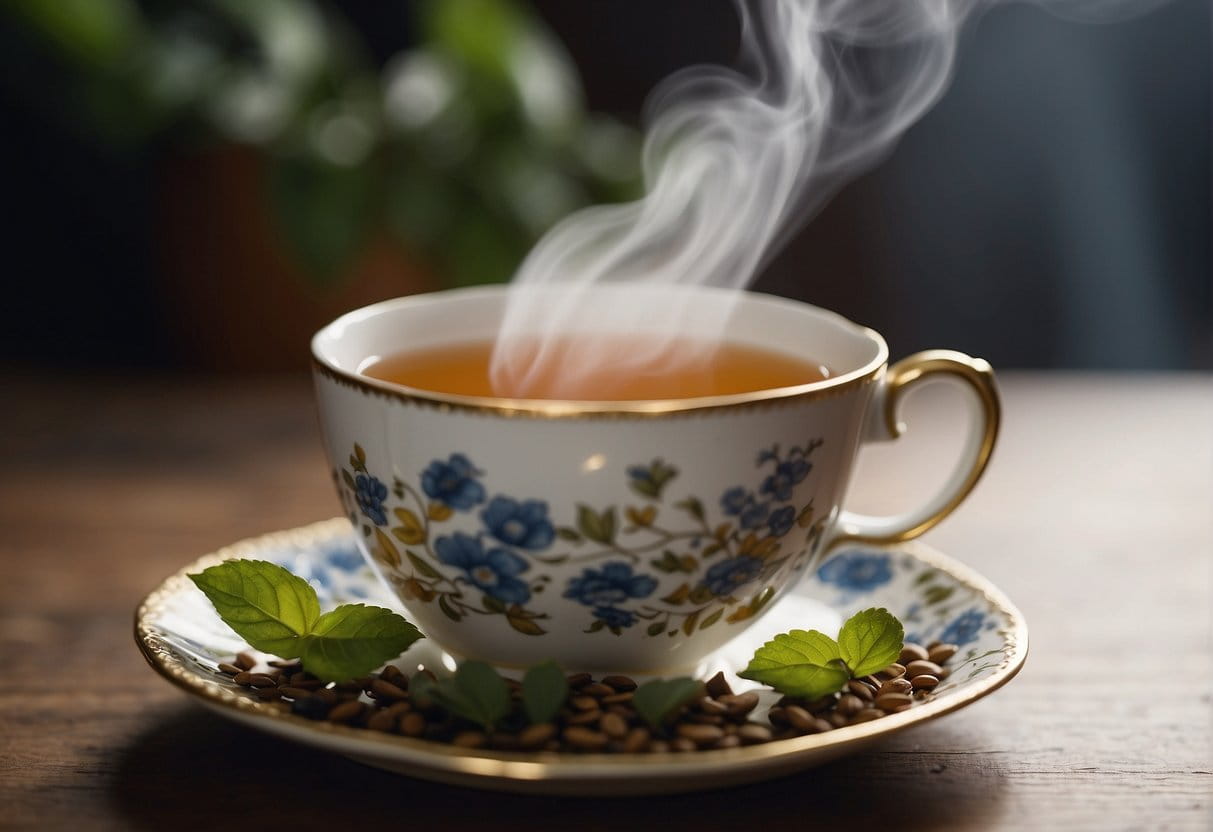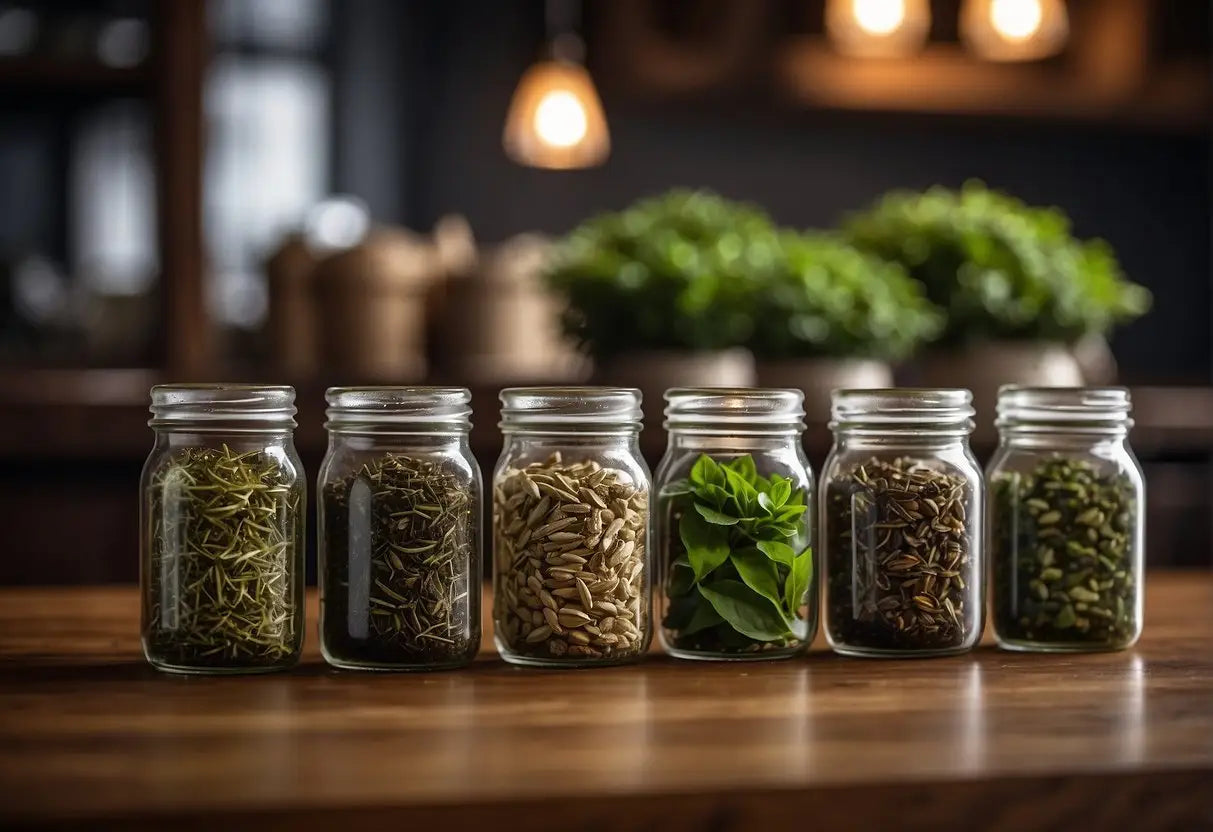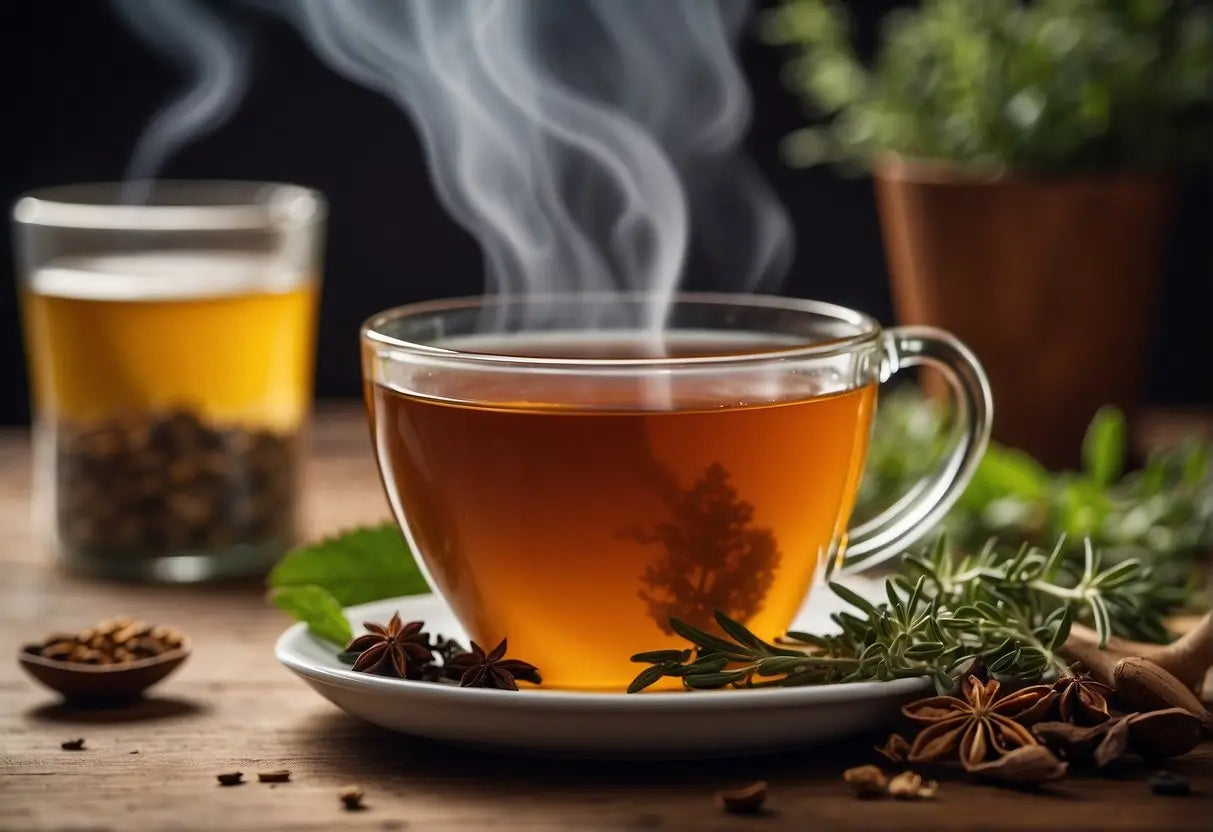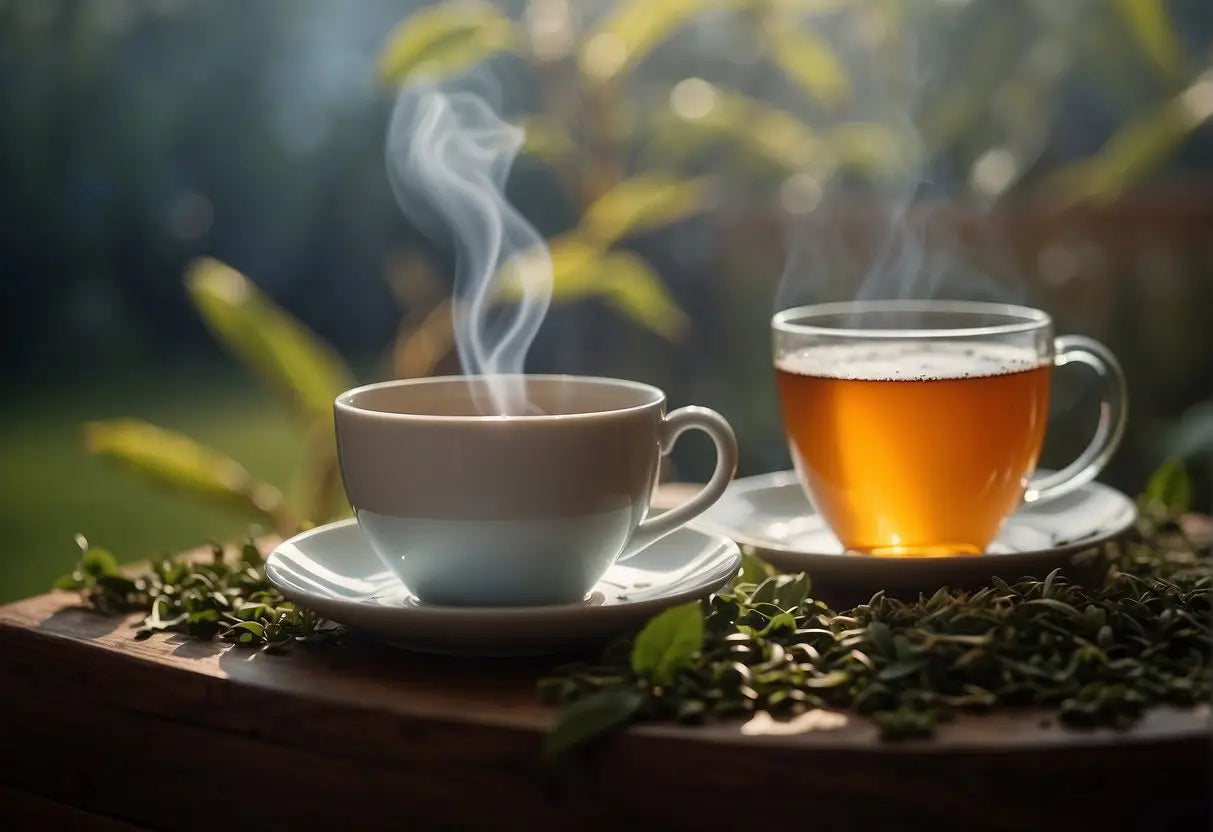What is Tea Drunk
Tea intoxication, often referred to as tea drunkenness, is a state that can result from consuming large quantities of tea in a short period. It is characterized by a variety of symptoms, most commonly including:
- Headaches: You might experience light to severe headaches, depending on your sensitivity to caffeine.
- Dizziness: A feeling of being lightheaded or unsteady is a common sign of tea intoxication.
- Nausea: Excessive tea drinking may lead to an upset stomach.
This condition arises due to the presence of certain compounds in tea:
- Caffeine: Overconsumption of this stimulant leads to most of the symptoms associated with tea intoxication.
- Theanine: While normally relaxing, in high doses, it may contribute to a heightened state of alertness that feels uncomfortable.
- Polyphenols: These antioxidants can be beneficial, but too much might upset your stomach.
To avoid tea intoxication, you should:
Bestsellers
- Moderately consume tea; be mindful of your body's reactions.
- Monitor intake, especially of teas with higher caffeine content (like black or pu-erh tea).
Remember, your threshold for caffeine and other compounds found in tea may differ from others, so it's important to pay attention to your own body's responses when enjoying your cup of tea.
Causes of Tea Drunkenness
Tea drunkenness typically results from consuming large quantities of tea in a short timeframe or drinking tea on an empty stomach. The main causes include the following:
Caffeine Content: Tea naturally contains caffeine, which is a central nervous system stimulant. Consuming high levels of caffeine can lead to feelings of lightheadedness, restlessness, or even nausea.
- Green tea: High in caffeine
- Black tea: Contains more caffeine than green tea
- White tea: Generally lower in caffeine
L-Theanine: An amino acid found in tea that promotes relaxation. An imbalance between L-Theanine and caffeine may result in mood swings or a sense of euphoria sometimes classified as tea drunkenness.
Tannins: These compounds can interfere with iron absorption and digestion, potentially contributing to an unsettled stomach when consuming tea in large amounts, especially on an empty stomach.
Hydration Status: Your state of hydration affects how your body processes the compounds in tea. Dehydration may amplify the effects of tea's components, increasing the likelihood of experiencing tea drunkenness.
To summarize, tea drunkenness is influenced by your physiological response to several compounds present in tea, moderated by individual factors such as tolerance, hydration level, and whether you consume tea with or without food.
Symptoms of Tea Intoxication

When you consume too much tea, several signs may indicate tea intoxication, also known as tea drunkenness. Your body's reaction can vary, but common symptoms include:
- Headaches: You might experience a dull, lingering headache as a result of excessive caffeine intake.
- Nausea: Overconsumption of tea can lead to an upset stomach, resulting in a feeling of queasiness.
- Heart palpitations: Too much caffeine can cause your heart rate to increase or feel irregular.
| Symptoms | Description |
|---|---|
| Dizziness | A sensation of spinning or unsteadiness. |
| Diarrhea | Increased bowel movements can occur due to high levels of tea. |
| Irritability | Mood changes or short tempers might arise. |
| Insomnia | Trouble falling or staying asleep due to caffeine stimulation. |
- Feeling jittery or restless can also be a symptom, often accompanied by an increased sense of anxiety or stress.
- Difficulty concentrating and feeling confused may occur, which can hinder your normal daily activities.
If you experience these symptoms, consider reducing your tea intake and consult a healthcare professional if they persist. Remember that individual tolerance to caffeine varies, and moderation is key to enjoying tea healthily.
Types of Tea and Potency

When you explore the world of teas, you'll find they vary widely in potency, which refers to their strength and impact on the body. The type of tea leaf and preparation method influence this. Generally, potency is associated with caffeine content and antioxidant levels.
Lao Ban Zhang
Black Tea: This is the strongest in terms of caffeine, with about 40-70mg per 8 ounces. Due to full oxidation, it’s robust and flavorful. Regular consumption can lead to tea drunkenness if you are sensitive to caffeine.
Green Tea: Slightly less potent than black tea, containing around 20-45mg of caffeine per 8 ounces. It's rich in antioxidants called catechins, which can affect you if consumed in high quantities.
Oolong Tea: Its potency falls between black and green teas, with caffeine content typically ranging from 30-50mg. The partial oxidation gives it a unique profile that can influence your alertness.
Herbal Teas: Diverse in range, herbal teas are generally not derived from Camellia sinensis and most are naturally caffeine-free. The potency of herbal teas depends on the specific herbs used.
White Tea: The least potent in terms of caffeine, yielding only about 15-30mg per 8 ounces. It's appreciated for its delicate flavor and low caffeine content, which makes it less likely to cause tea drunkenness.
| Type of Tea | Caffeine Content (per 8oz) | Notes on Potency |
|---|---|---|
| Black Tea | 40-70mg | High caffeine, robust flavor |
| Green Tea | 20-45mg | Moderate caffeine, rich in antioxidants |
| Oolong Tea | 30-50mg | Medium caffeine, unique flavor |
| Herbal Teas | Varies (often caffeine-free) | Potency varies with herbs used |
| White Tea | 15-30mg | Low caffeine, delicate flavor |
Remember, these numbers can vary based on the specific type of tea and how it is brewed. Pay attention to how different teas affect your body to manage tea drunkenness effectively.
Prevention Strategies

To prevent becoming tea drunk, moderation is key. Limit your intake to a few cups per day, especially if you're sensitive to caffeine or trying out a new type of tea.
Choose lower-caffeine teas, such as herbal blends or white tea, particularly if you're consuming multiple cups in a short period. This can greatly reduce the likelihood of adverse effects.
Incorporate a healthy meal or snack before or while drinking tea. Food in your stomach can slow the absorption of caffeine and reduce symptoms.
Stay hydrated by drinking plenty of water alongside your tea. It's easy to forget that tea is a diuretic, which can lead to dehydration if you're not careful.
Plan your tea consumption to avoid drinking late in the day. This will not only help prevent sleep disruption but also reduce the chance of being tea drunk.
Follow these guidelines:
- Limit Intake: No more than 3-4 cups per day
-
Tea Choices:
- Herbal Teas
- White Tea
- Diet: Eat before drinking tea
- Hydration: Drink water as well
Remember that everyone's body reacts differently to tea and its caffeine content, and what might be too much for one person could be just fine for another. Listen to your body and adjust accordingly.
Responses to Tea Drunkenness
If you experience tea drunkenness, here are some strategies to alleviate the symptoms:
-
Hydration: Drink plenty of water to dilute the concentration of caffeine in your system.
-
Food Intake: Eat a starchy or protein-rich snack to help absorb the tea and slow down the absorption of caffeine.
-
Rest: Sit or lie down and take deep breaths. Closing your eyes and resting can help reduce dizziness or light-headedness.
-
Reducing Intake: Limit your tea consumption to avoid repeated episodes, especially if you are sensitive to caffeine.
-
Herbal Teas: Switch to herbal teas that do not contain caffeine, such as chamomile or peppermint.
| Action | Rationale |
|---|---|
| Increase Water | Helps flush out caffeine and rehydrates your body. |
| Eat Snacks | Provides sustenance to counteract the effects of excessive tea. |
| Rest | Gives your body a chance to recover from overstimulation. |
| Limit Tea | Prevents further overconsumption and accumulation of caffeine. |
| Choose Herbal | Offers a |
Differences from Alcohol Intoxication
When you experience tea drunkenness, you're encountering a state often characterized by lightheadedness, relaxation, or euphoria. This is different from alcohol intoxication, which has more pronounced physical and cognitive effects. Here are some key distinctions:
-
Chemical Compounds: Your tea buzz is primarily due to caffeine and L-theanine, which have stimulating and calming properties, respectively. In contrast, alcohol intoxication results from ethanol, a depressant that significantly impairs your motor skills and decision-making abilities.
-
Symptoms: Tea drunkenness might make you feel jittery or mentally alert, but you won't exhibit slurred speech or loss of coordination, common signs of alcohol intoxication.
-
Health Impact: Moderate consumption of tea can be beneficial for you, offering antioxidants and other healthful compounds. However, even moderate alcohol use carries risks, and excessive consumption can lead to severe health problems.
-
Aftereffects: If you drink too much tea, you may have trouble sleeping or feel a bit anxious due to caffeine. Alcohol, on the other hand, can lead to a hangover — a combination of headache, nausea, and fatigue.
-
Social and Legal Consequences: There are no legal limits on tea consumption, and being tea drunk in public is not a crime. Alcohol intoxication can lead to legal troubles, including DUI charges, and is often not socially acceptable in professional or formal settings.
| Feature | Tea Drunkenness | Alcohol Intoxication |
|---|---|---|
| Causes | Caffeine and L-theanine | Ethanol |
| Immediate Symptoms | Euphoria, lightheadedness | Slurred speech, impaired coordination |
| Long-term Health Impact | Generally beneficial in moderation | Potentially harmful even in moderation |
| Aftereffects | Insomnia, mild anxiety | Hangover symptoms |
| Legal Status | No restrictions | Legal intoxication limits, potential DUI |
Cultural Perspectives on Tea Drunkenness
Tea drunkenness, often perceived differently across cultures, refers to a state you might reach after consuming large amounts of tea, especially strong or high-quality varieties.
In Chinese culture, tea is seen as more than just a beverage; it plays a significant role in social rituals and personal health. Tea drunkenness (茶醉 Chá zuì) is recognized in traditional Chinese medicine as a condition that could arise from overconsumption, causing symptoms like light-headedness, palpitations, or weakness. It's not typically viewed negatively; some even seek the mild euphoria associated with it.
Japanese tea traditions regard tea as a meditative and communal experience. Here, tea drunkenness isn't a common term, but any adverse effects from overconsumption might be considered a disruption to the harmony and balance that tea ceremonies aim to create.
In the United Kingdom, where tea drinking is a national pastime, "tea drunk" is not a widely recognized term. Overindulgence is uncommon due to the moderate strength of teas typically consumed, such as black tea with milk.
You'll find a summary of perspectives below in the provided table:
| Culture | Perception of Tea Drunkenness | Common Reaction |
|---|---|---|
| Chinese | Recognized state; sometimes sought after | Mild euphoric symptoms |
| Japanese | Not commonly referenced; imbalance | Rare in tea ceremonies |
| United Kingdom | Uncommon term; overindulgence is rare | Moderate tea drinking |
In each of these cultures, the response to tea drunkenness varies, influenced by historical attitudes, social practices, and the type of tea consumed. While the condition is acknowledged, responses range from acceptance to avoidance.
Health Implications
Tea drinking can be both beneficial and detrimental to your health, depending on the quantity and type of tea consumed.
Positive Implications:
- Moderate tea consumption may contribute to improved hydration and antioxidant intake.
- Certain tea compounds like flavonoids can support heart health.
Potential Risks:
- Excessive tea intake may lead to caffeine-related side effects including insomnia, heart palpitations, and nervousness.
- Tannins in tea can interfere with iron absorption, potentially leading to iron deficiency when consumed in large quantities.
Amount Matters: It's crucial to balance your tea intake. While one to three cups a day are generally considered safe, more than that might cause health issues.
Individual Sensitivity: Your own sensitivity to caffeine also plays a role. Some may experience jitters or digestive issues with even small amounts of tea.
Table 1: Tea Consumption Guidelines
| Daily Cups of Tea | Health Impact |
|---|---|
| 1-3 | Typically beneficial |
| 4-5 | Possible mild side effects |
| 6+ | Increased risk of side effects |
Stay informed about various types of tea as they contain differing amounts of caffeine and tannins. Herbal teas usually contain less or no caffeine, which might be a better option if you're sensitive to stimulants. Remember to consider your overall diet and health conditions when deciding on the amount of tea suitable for you.
Research on Tea Intoxication
Tea intoxication, or "tea drunk," is a phenomenon that occurs when you consume large amounts of tea in a short period. Scientific studies suggest that the condition is particularly associated with strong tea or tea that has high caffeine and catechin content.
Key Findings:
-
A study published in the Chinese Journal of Integrative Medicine in 2012 indicated that certain compounds in tea, such as caffeine and theanine, can affect the central nervous system, leading to symptoms of lightheadedness or euphoria typically associated with being "tea drunk."
-
Research suggests these effects are often more pronounced with teas that have a higher concentration of these substances, like Pu-erh or Oolong.
Symptoms Enumerated:
- Mild headache
- Nausea
- Vertigo
- A sense of euphoria
The symptoms you experience when tea drunk are akin to a mild form of traditional inebriation. These effects are temporary and tend to subside once the compounds are metabolized by your body.
Factors Influencing Tea Intoxication:
- Dose: The amount of tea consumed
- Type of Tea: Some teas have a higher intoxication potential
- Individual Sensitivity: Your personal tolerance to caffeine and other tea components
The phenomenon is complex, and individual responses can vary greatly. If you are sensitive to caffeine or drink tea on an empty stomach, you might be more likely to experience these effects. Remember, moderation is key in tea consumption to avoid any unwanted side effects.
Frequently Asked Questions

In this section, you'll find concise answers to questions commonly asked about the state of tea drunkenness, ranging from its symptoms to cultural perceptions.
What are the common symptoms experienced when one is tea drunk?
When you are tea drunk, you might experience dizziness, a sense of euphoria, slight confusion, nausea, or a feeling of being hyper-alert. These symptoms can vary based on the individual.
How does one achieve a state of tea drunkenness?
To become tea drunk, you typically consume large quantities of strong tea, especially on an empty stomach. It involves drinking tea quickly, which can increase caffeine absorption.
Can tea consumption cause a similar intoxication as alcohol?
No, tea drunkenness is not the same as alcohol intoxication. While both can alter your state of mind, the effects of tea come from caffeine and other compounds in tea, not alcohol.
Which types of tea are known to potentially induce tea drunkenness?
Teas with high levels of caffeine and theanine, such as Pu-erh, Oolong, and green teas, are more likely to make you tea drunk. The quality and brewing time can also influence the effect.
What physiological effects lead to the feeling of being tea drunk?
The combination of caffeine and L-theanine found in tea leaves stimulates your nervous system, leading to increased alertness and changes in mood, which contribute to the sensation of being tea drunk.
How is experiencing tea drunkenness culturally perceived in China?
In China, tea drunkenness is often seen as a sign of deep appreciation and understanding of tea culture. It can be a desirable and sought-after experience among tea enthusiasts.
← Older post Newer post →











